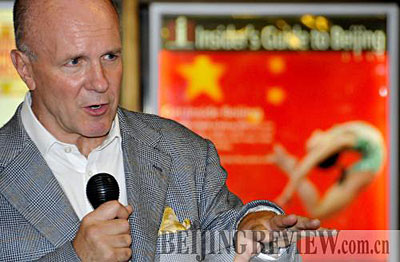|
 |
|
Simon Winchester came to China in mid April for the launch of the Chinese edition of his book The Man Who Loved China (SHI GANG) |
"At first, I didn't know if I was going to write an intellectual biography of him or a human biography," Winchester told Beijing Review. "After six months of struggling, I decided to make it a constitutional story about a human being rather than his mind, because he was such a wonderful, interesting, colorful, very human human being with all sorts of faults. Then it became easier."
In the book, Winchester argues that the reason Needham fell in love with China was because of Lu Gwei-Djen, his mainland-born mistress who finally married him at age 85 when he was 89.
"I think people would like to know that kind of thing--why a Western man fell in love with China, because he fell in love with a Chinese woman and her language," he said.
According to Needham's diary, they met in August 1937 and had an affair in February 1938. The first Chinese character to appear in his diary that Lu taught him was the one for "cigarette."
"A door had opened into a completely alien universe," Winchester said. "He learned Chinese and became the biggest expert on China, and it all began with a love affair. I just thought it was beautiful."
The second turning point in Needham's life was the day he arrived in Kunming, southwest China's Yunnan Province, in 1943. He discovered that the first Chinese grafting technique for fruit trees was 600 years older than anything ever known in ancient Greece. He then realized that China had made achievements that people in the West had not yet acknowledged. He decided to collect a list of these achievements and spent the rest of his life doing so. When he died in 1995, Science and Civilization in China, first published in 1954, contained 17 volumes.
In 2006, Winchester came to China to retrace Needham's footsteps, living in a hotel in southwest Chongqing Municipality for a few weeks because Chongqing had been Needham's base in the 1940s. He got a car and drove from Chongqing to the northwestern city of Dunhuang in Hexi Corridor, down to the Chinese border with Myanmar, to the southeastern city of Fuzhou and up to Xi'an and Beijing.
The most adventurous journey occurred on his way to Hexi Corridor along the Great Wall in June. It was 8 p.m. The car Winchester and his interpreter had rented hit a rock and the oil pan cracked in the Gobi Desert, about 400 km away from Dunhuang. They managed to call the nearest hotel and were finally rescued by the staff.
Another unbelievable moment during his writing occurred in December 2006 in Washington, D.C., when Winchester had a small conversation about Joseph Needham with a Shanghai-born restaurant deliveryman, a man Winchester later recognized as one of his acquaintances in China in the 1990s with whom he had lost contact.
"Thanks to Joseph Needham, we managed to meet again," he said.
It took Winchester two years to finish the book, titled The Man Who Loved China: The Fantastic Story of the Eccentric Scientist Who Unlocked the Mysteries of the Middle Kingdom, published by HarperCollins in 2008.
The man who loved China
Winchester's book hit the market under two different titles in the UK and the U.S.
Winchester said he personally felt sorry for the title of the UK edition--Bomb, Book and Compass: Joseph Needham and the Great Secrets of China--and preferred The Man Who Loved China.
"It is about this man who loved China, not bombs, books and compasses," Winchester said. "But my publisher in the UK thought it was too neutral. The book's reception in England was far less warm than in America. That's peculiar because Needham was an Englishman, but very few English people have ever heard of him.
"He was one of the greatest unsung heroes. He was so well known in China. I think my job in having this book published in the West was to reintroduce a man who had been totally forgotten," he continued.
The Chinese edition was published by Shanghai Scientific and Technological Literature Publishing House on April 20 in Beijing.
"China is very patient and takes the long-term view," Winchester said. "Some people in the West are afraid of China because it is becoming so powerful. But I welcome her wonderful developments in recent decades. I want China to be happy and prosperous."
Winchester said he is proud to have his first book published in China.
"It might encourage young Chinese people who perhaps don't know about Joseph Needham," he said. "Modernization in China is tempting a lot of young Chinese to behave in a very Western way. To tell Needham's story is to remind Chinese people what an amazing history they have and who they are. So if people read this book, it will remind them that China is not just peripheral to the construction of human civilization, but central to it. Joseph Needham felt very strongly that young Chinese people have so much to be proud of. So do I."
About Simon Winchester
Born in 1944 in Great Britain, Winchester obtained a geology degree at Oxford University in 1966. He served as a Hong Kong-based foreign correspondent for The Guardian and was an Asian correspondent for the Times (UK). His nonfiction books include The Professor and the Madman, The Map That Changed the World, Krakatoa and A Crack in the Edge of the World. | 